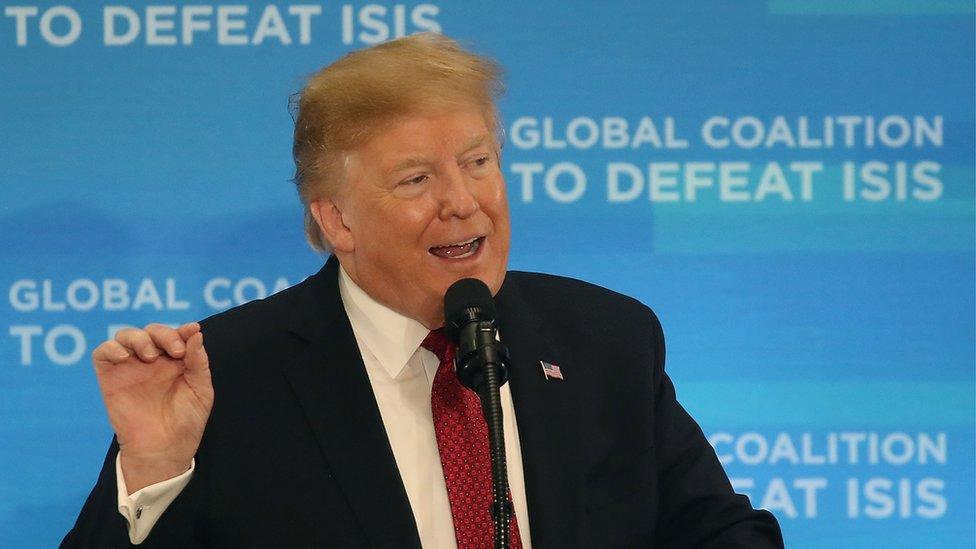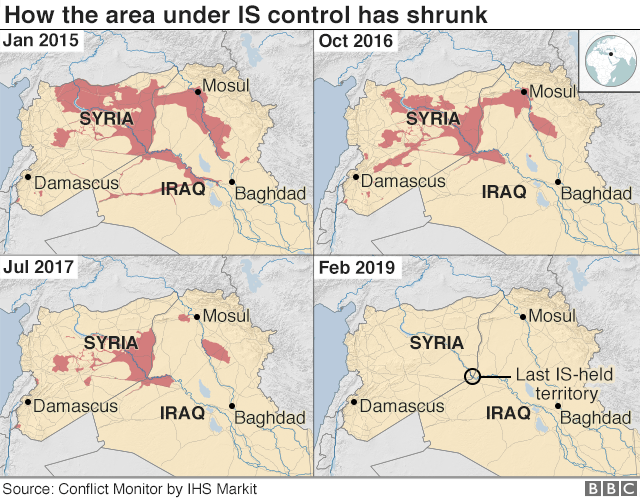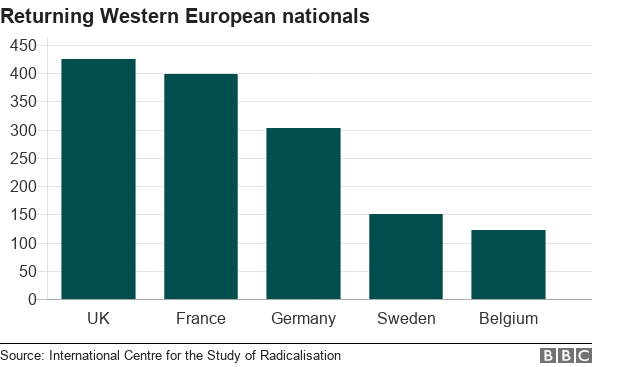Trump tells European countries to take back IS fighters
- Published

Donald Trump: "Put them on trial"
President Donald Trump has told the UK and other European allies to take back and put on trial more than 800 Islamic State (IS) fighters captured in the final battle against the group.
His tweet comes as US-backed Kurdish forces continue an assault on the last pocket of IS territory on the Syrian side of the Iraqi border, at Baghuz.
The captured IS fighters are being held by the Kurdish-led forces.
Mr Trump has said for several days that the IS caliphate is "ready to fall".
What is Mr Trump's reasoning on IS fighters?
He said in a tweet: "The US does not want to watch as these ISIS fighters permeate Europe, which is where they are expected to go. We do so much, and spend so much - Time for others to step up and do the job that they are so capable of doing."
Otherwise, he said, the US would be forced to release them.
Allow X content?
This article contains content provided by X. We ask for your permission before anything is loaded, as they may be using cookies and other technologies. You may want to read X’s cookie policy, external and privacy policy, external before accepting. To view this content choose ‘accept and continue’.

Trump administration officials have also told the Sunday Telegraph newspaper that they fear some of the detained fighters would put European countries at risk unless they are brought to justice. , external
Mr Trump's remarks echo those made by the UK's foreign intelligence chief on Friday, who warned that the Islamic State group was reorganising for more attacks despite its military defeat in Syria.
Alex Younger also told of his concern about jihadists returning to Europe with "dangerous" skills and connections.
Mr Trump's tweets come amid a controversy in the UK over the case of Shamima Begum, one of three schoolgirls who left London in 2015 to join IS.
She has said she wants to return, and her family in the UK have asked authorities to allow her to do so, but the government is making no attempt to bring her back to the UK.
On Sunday, Ms Begum's family said they had been told she had given birth.

On Sunday, the US-backed and Kurdish-led Syrian Democratic Forces (SDF) insisted that foreign fighters would not be tried "on our land... they will be tried by their own countries".
What is the latest on the final battle?
President Trump said on Friday the defeat of IS would be announced "over the next 24 hours".
But that passed with no further announcement from the White House.
Interview with Islamic State "Beatles" duo
Jiya Furat, the leader of the battle for Baghuz for the SDF, said IS fighters were now trapped in a section of the town that was 700 metres long and wide.
On Sunday, SDF spokesman Mustefa Bali said the IS group had blocked roads out of zone, stopping some 2,000 civilians there from escaping.
Thousands have left the Baghuz pocket in recent weeks but one SDF fighter told Agence France-Presse it had been two days since anyone had arrived, with lorries parked to transport them lying empty.
A spokesman for the US-led coalition, Sean Ryan said those who had escaped reported that remaining civilians were being used as human shields.
IS has suffered substantial losses, but the UN has said it still reportedly controls between 14,000 and 18,000 militants in Iraq and Syria.


How many fighters are returning to EU countries?
Approximately 5,904 nationals from countries in Western Europe like France, Germany and the UK have travelled to Iraq and Syria to join the Islamic State, according to a report by the International Centre for the Study of Radicalisation (ICSR), at King's College London., external
Western European countries have seen a total of 1,765 nationals return, according to the study.

Research by the European Parliament (EP), external suggested that half of those who left the UK to join IS have come back. It said about a third of German and Belgian nationals had returned but France had a return rate of just 12%.
EU countries have adopted different approaches to dealing with these people, based on criminal investigation, risk assessment, rehabilitation and reintegration schemes.
The EP report notes that countries have adopted a case-by-case approach for children returning to Europe, the vast majority of whom were born in Iraq and Syria after 2012.